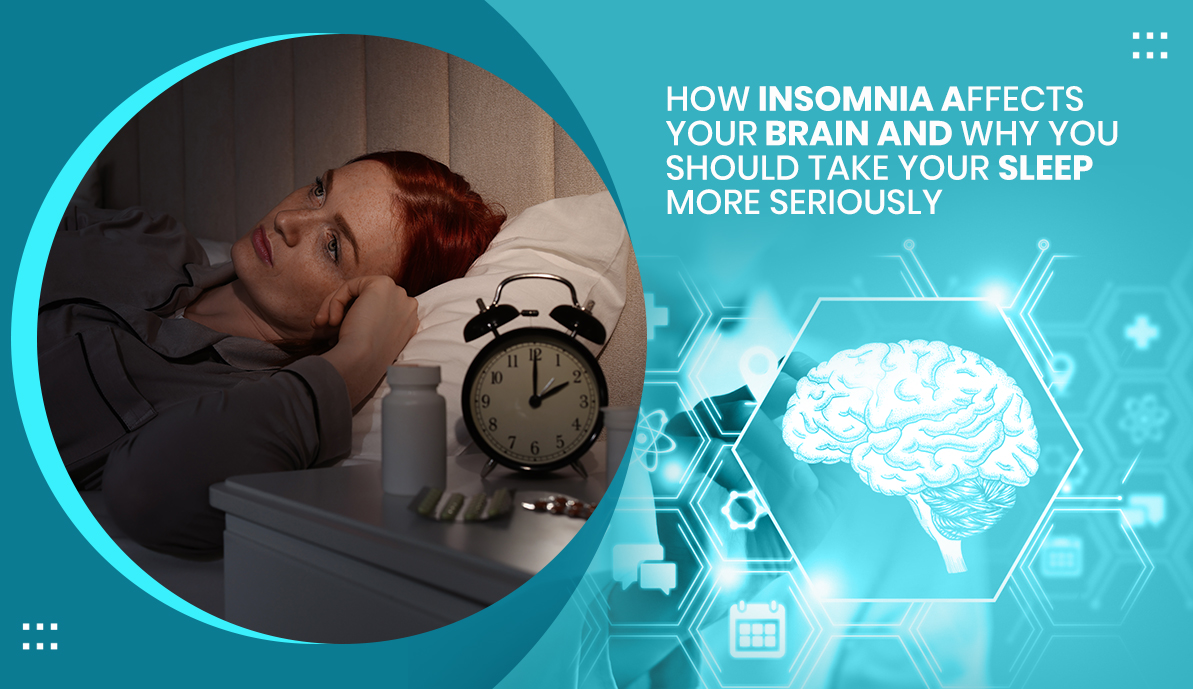Are you still tossing and turning all night? You aren’t alone. You are experiencing insomnia. Insomnia isn’t just about missing out on sleep; it also affects and misleads your brain in several ways, as most people fail to realize. A stormy night here and there will never break you. But if a sleepless night becomes the norm, your brain does pay the price. It is from memory lapses to mental fog; the damage can be severe.
Furthermore, this blog explores why insomnia may become more than just a sleep issue and how it can significantly impact your brain health.
What Exactly Happens to Your Brain When You Don’t Really Sleep?
In the field of medical science, experts believe that sleep is not merely rest, but rather a period of repair for the brain. The brain removes toxins, consolidates neural pathways, and stores several memories during sleep. Somehow, if insomnia prevents you from sleeping, it all gets erased, resulting in –
Toxic buildup
At times, your brain removes toxic Alzheimer’s proteins during deep sleep. Further, without sleep, these toxins don’t just go away and lead to an increased risk of neurodegeneration.
Weakened connections
The circuits do assist you in clear thinking, and memory further begins to weaken, and it becomes tough to act normally.
Brain inflammation
It is chronic insomnia that causes the inflammation, which makes you responsible for all sorts of mental disorders and brain ageing. It is why the effects of insomnia on the brain are far more than just fatigue. It does shift the operation of your brain.
What Causes Insomnia?
Before addressing a condition like insomnia, it is crucial to understand the underlying causes. A range of mental, physical, and environmental factors can trigger insomnia.
Stress and Anxiety
When your mind is racing with thoughts regarding work, finances, or relationships, falling asleep becomes a struggle. High stress levels keep your brain in a fight-or-flight mode by preventing relaxation.
Poor Sleep Habits
At times, irregular sleeping patterns, excessive screen time before bed, consuming caffeine, or drinking alcohol late in the evening all interfere with your body’s ability to relax.
Medical Conditions
Acid reflux, chronic pain, asthma, and even hormonal imbalance can result in a sleepless night. Sleep apnea is a condition in which breathing stops and starts repeatedly, disturbing the sleep cycles.
Mental Health Disorders
Anxiety and depression are consistently linked with insomnia. It is a negative feedback loop in which sleep deprivation can lead to mental illness and a poor state of mind that makes it increasingly complex to sleep.
Medications
Even some medications to treat high blood pressure, asthma, and depression do contain side effects that disturb sleep. At times, over-the-counter painkillers and decongestants can disrupt sleep patterns.
Lifestyle Choices
Daily travel, night work, and random sleeping patterns do play tricks on your internal clocks. Therefore, it could become harder to fall asleep and remain asleep.
At first, you should know the reason why insomnia is occurring, which enables you to take the correct measures to improve it before causing significant damage to your brain.
Insomnia and Brain Fog: The Unseen Consequence
Have you ever woken up after having a sleepless night and felt your brain was functioning in slow motion? That is known as insomnia and brain fog being in action. It is sleep deprivation that impacts your ability to focus, process information, and react quickly. Here’s how it happens.
Slower Thinking
Lack of sleep reduces activity in the prefrontal cortex, which is responsible for decision-making and problem-solving. Contact a doctor for medical advice and obtain your prescribed medications from Meds Magic, as we offer FDA-approved medicines such as Eszopiclone (1mg, 2mg, 3mg), Zopiclone (7.5 mg), and Zopisign (10 mg) to treat insomnia effectively.
Poor Memory
It is the hippocampus that is responsible for storing memories, and it does not function well when you are sleep-deprived, making you forgetful by nature.
Impaired Judgment
Sleep loss also affects the brain’s ability to assess risks and make sound decisions. If you are still struggling to concentrate, misplacing things, or feeling mentally drained, chronic insomnia can become the ultimate culprit in this situation.
Can Insomnia Cause Brain Damage?
This is where things do get serious. According to studies, it is suggested that brain damage due to insomnia isn’t just a myth, but is caused by long-term sleep deprivation. It can actually shrink certain areas of the brain.
Gray Matter Loss
Insomnia is linked to a reduction in gray matter, especially in areas which is responsible for memory, emotions, and self-control.
Increased Risk of Neurodegenerative Diseases
The medical practitioners often believe that chronic insomnia is clearly associated with both Alzheimer’s and Parkinson’s, and several other cognitive disorders.
Higher Stroke Risk
At times, sleep deprivation does increase the likelihood of strokes due to reduced blood flow to the brain. If insomnia robs you of sleep every night, it’s not just your energy level that gets affected; it may also physically alter your brain.
Long-Term Effects of Insomnia on the Brain
Furthermore, missing a few nights of sleep is often rough, but the long-term effects of insomnia on the brain are where things get truly dangerous. The damage accumulates over time, leading to:
Increased Anxiety and Depression
At times, chronic sleep deprivation messes with neurotransmitters in your brain, like serotonin and dopamine. It does worsen mood disorders.
Higher Risk of Dementia
Further, people with long-term insomnia have a huge risk of developing dementia.
Cognitive Decline
Over time, even simple tasks like recalling names, staying entirely focused, or problem-solving become really hard. However, ignoring insomnia isn’t just about dealing with tiredness. It is also about protecting your brain from permanent damage.
How to Protect Your Brain from the Damage of Insomnia?
If insomnia is ruining your sleep night after night, you can do whatever you can to limit the damage that it inflicts on your brain. The best part? Your brain has a fantastic capacity for recovery, provided it is given the appropriate conditions. Here is how you can shield yourself against the long-term effects of insomnia on the brain and regain your cognitive health.
Set Your Sleep Schedule
As we all know, the human body loves strict routines, and so does our brain. A regular sleep schedule helps maintain your circadian rhythm, the internal body clock that regulates when you sleep and wake on schedule.
Just go to bed and rise at the same time every day, including the weekends. Do skip long afternoon naps during the day, as they tend to make nighttime sleeping more difficult.
Use light to your benefit by getting morning sunlight, and turn down your lights in the evening to signal to your brain that it’s time to relax.
Limit Screen Time Before Bed
It is the blue light from phones, tablets, and computers that disrupts melatonin release, making it more difficult for your brain to relax. Limit your screen time by at least 1 hour before your bedtime. If that seemed impossible, try switching to night mode or a warm light as well.
Even consider using blue light-blocking glasses if you use screens in the evening. Try replacing screen time with a relaxing bedtime routine, such as listening to calming music, meditating, or reading a book that might help you unwind.
Stress and Anxiety Management
Stress is one of the largest perpetrators of insomnia. Long-term stress can also increase the effects of insomnia on the brain through elevated inflammation and impaired balance of neurotransmitters.
Take slow and deep breaths. At times, deep breathing can activate your body’s relaxation response. Meditate or practice mindfulness; both can be used to enhance sleep quality by minimizing stress and soothing frantic brain activity. Try to write down your thoughts at night; if racing thoughts are keeping you awake, journaling can help soothe your brain.
Optimise Your Sleeping Environment
In the long term, your bedroom needs to be set up to ensure sleep comfort, darkness, and silence, as these factors will help guard against insomnia and brain damage.
- Do make your bedroom cold (about 18-22 degrees centigrade), a cooler room guarantees deeper sleeping.
- Keep noise down with earplugs and a white noise machine.
- Do invest in a quality mattress and pillows. Since discomfort makes it more difficult to fall and remain asleep.
Pay Attention to What You Eat and Drink
What you generally eat is a significant factor in the quality of your sleep, as certain food items and beverages can help alleviate insomnia. Don’t take caffeine, nicotine, and alcohol at night. Caffeine does remain in your system for hours, and it is alcohol that may make you feel drowsy, as it interrupts deep sleep.
Try to avoid heavy food late at night. Therefore, having a full stomach can be uneasy and lead to acid reflux, making it difficult for you to sleep. Add sleep-inducing foods and magnesium-rich foods, such as almonds, bananas, and dark chocolate. It does help to relax your mind.
Concluding thoughts
Insomnia is not just about feeling groggy the very next day. It is a serious issue with long-lasting consequences on brain health. From insomnia and brain fog to actual structural changes in the brain, sleep deprivation takes a real toll. If you are struggling with insomnia, it is time to take action before the damage becomes irreversible. Contact your doctor and get prescribed FDA-approved medicines for yourself from Meds Magic to overcome insomnia.



